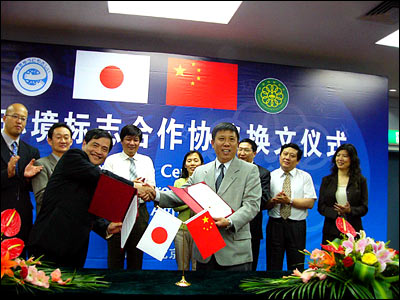China supports global environmental efforts and has played an
active role in international environmental affairs. Since 1994 when
the United Nations Framework Convention on Climate Change went into
effect, China has adhered to its principles in international talks
on climate change, adopting measures and defending the legitimate
rights of changes, adopting measures and defending the legitimate
rights of China and other developing countries. China signed in May
1998 and approved in August 2002 the Kyoto Protocol on climate
change and has been earnestly performing its duties.
 |
China signed and approved the Stockholm Convention on Persistent
Organic Pollutants (POPs) in May, 2001 and June, 2004 respectively,
which is the third mandatory international convention that requires
decrease in discharge of pollutants after Vienna Convention on the
Protection of Ozone Layer in 1987 and United Nations Framework
Convention on Climate Change in 1992. Having paid great attention
to persistent organic pollutants, the Chinese government organized
a leading team of drawing up the national implementation plans. The
State Environmental Protection Administration specially established
the leading team and office of implementing protocols. China will
take necessary legitimate, administrative and technical measures to
reduce, control and dispose of persistent organic pollutants; and
will handle them in a safe, effective and hazard-free
way.
As a member state of the Global Environmental Fund (GEF), China
has maintained close cooperative relationship with the
organization, an international fund-management partnership founded
in 1992 that has become the largest investor in the world in the
fields of international environmental protection. China is also one
of the few donators among the developing countries, having played
an active role in fund-raising. At the same time, the GEF has
provided financial and technological assistance in helping China to
protect the environment and fulfill international treaties. With
the help of GEF, China has undertaken dozens of projects while
receiving some several hundred million US dollars in donating from
the GEF. This made China the biggest beneficiary of the GEF.
Non-governmental environmental protection organizations from
various countries in the world, such as the World Wide Fund for
Nature and International Fund for Animal Welfare, have cooperated
with relevant Chinese authorities and non-governmental
organizations in various fields, and achieved positive
results.
China first created the mode of "China Council for Cooperation
on Environment and Development" in the world, which consists of
some 40 experts and acts as a senior consultancy for the
government. Since its establishment more than a decade ago, it has
made many constructive proposals to the Chinese government and is
respected abroad for its international environmental
cooperation.
In 2005, the State Environmental Protection Administration
awarded the "International Cooperation Prize of Environmental
Protection" to three international friends who made great
contribution to China's environmental protection. They were:
Kruger, Director of the Research Center of International
Environment Management of Technology University of Dresden, Andrea
De Angelas, Italian Project Manager of the Beijing Office of the
Sino-Italian Cooperation Program for Environmental Protection and
Vice President Hau-sing Tse of the Canadian International
Development Agency.
During 2004 and 2005, China intensified its international
environmental cooperation; the State Environmental Protection
Administration organized 90 major international events relating to
environmental protection and China paid mutual environmental visits
to countries such as Japan, Korea, Canada, France, Italy, Norway,
Russia, and Sweden. It concluded 12 international environmental
protocols and multi-lateral environmental negotiations; as one of
the 12-member lead team of the Coordinating Mechanism of Regional
Cooperation in Asia, the State Environmental Protection
Administration energetically promoted ASEAN-China, Japan and Korea,
and ASEAN-China environmental cooperation as well as Mekong River
environmental cooperation; it started the China-EU Ministerial
Dialogue on Environmental Policies, signed the Memorandum of
Understanding on Scientific and Technological Cooperation for
Environmental Protection with the US Environmental Protection
Agency and took part in WTO negotiations on trade and
environment.